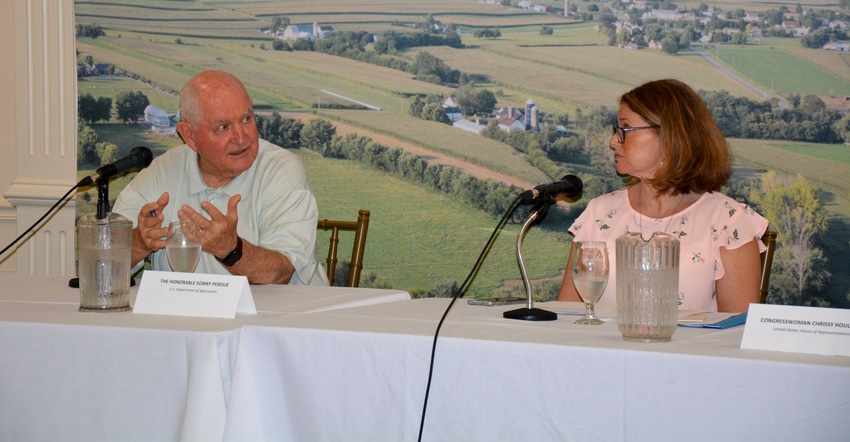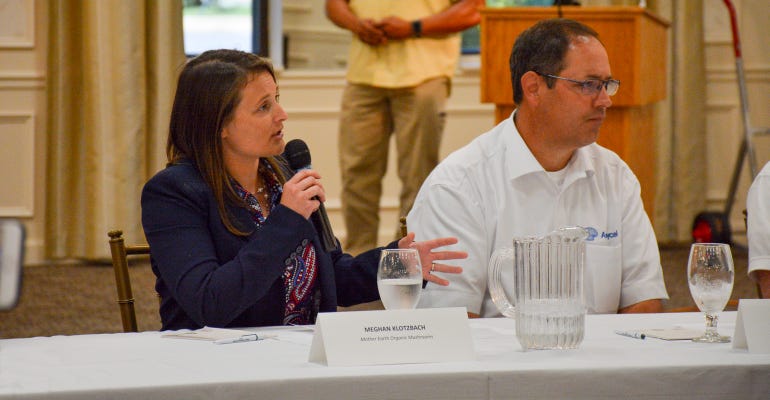
U.S. Secretary of Agriculture Sonny Perdue has largely completed his goal of visiting all 50 states within the first couple of years of being ag secretary.
One of his final stops was a recent visit to New York and Pennsylvania, where he visited a mushroom growing operation in Chester County, Pa.; the New Holland North America headquarters in New Holland; Chobani in New York state; and held several roundtables with local ag leaders and farmers.
A roundtable in Kennett Square, the heart of the so-called “mushroom capital of the world,” attracted dozens of farmers and industry representatives who pressed Perdue on labor, regulations and trade.
Here are three things gleaned from Perdue’s recent visit:
Labor is a problem
From mushrooms to other specialty vegetables, finding and keeping a reliable workforce is the biggest issue for many farmers.
“We actually can’t grow more because of lack of workers to harvest the crop,” Meghan Klotzbach, regulatory manager of Mother Earth Organic Mushrooms, told Perdue. “That labor is a skilled labor force. These harvesters take nine months to a year to learn how to do it,” making the current H-2A guest worker program limiting, she said.
Pete Flynn, owner of Pete’s Produce Farm in West Chester, told Perdue that two of his most skilled workers, who have been with him for 15 years through the federal guest worker program, were denied their visas this year.
Perdue said the goal is to pass a comprehensive immigration reform package, but he also said there is enough “liquidity” in Washington for a merit-based or security-backed guest worker program focused on agriculture.
On the issue of denied visas, Perdue said USDA doesn’t have statutory authority to deal with guest worker visas and that he’s heard about denied visas from many farmers across the U.S.
“We need an ag sector guest worker program to ensure people can come and go on an ongoing basis,” he said.
Trade taking its toll
Mushroom reps pressed Perdue on the effects of current trade policy, saying that tariffs have led to big increases in the cost of steel to make cans for mushrooms.
During a visit to the New Holland plant, leaders of New Holland Agriculture and CNH Industrial urged Perdue to help get the U.S.-Mexico-Canada Agreement ratified in Congress.
Rick Ebert, president of Pennsylvania Farm Bureau, talked about the effects of trade on dairy.
"We really need to see a light at the end of the tunnel, especially when it comes to USMCA," Ebert said. Mexico and Canada are the No. 1 and No. 3 export countries for U.S. dairy products.
“As this trade war continues and goes on longer and longer, other countries aren’t going to view us as a good trading partner,” he said. “The sooner we can get this behind us, I think the better off we are for agriculture and the U.S. as a whole.”
Perdue said that President Donald Trump uses tariffs as a leverage to get better deals for the U.S. He said the U.S. played a key role in helping rebuild countries after World War II, much of that through trade deals, but that now is the time to level the playing field.
 LABOR PROBLEMS: Meghan Klotzbach, regulatory manager for Mother Earth Organic Mushrooms, said a lack of workers makes it difficult to harvest a mushroom crop.
LABOR PROBLEMS: Meghan Klotzbach, regulatory manager for Mother Earth Organic Mushrooms, said a lack of workers makes it difficult to harvest a mushroom crop.

Rep. Chrissy Houlahan, D-Pa., said the USMCA deal is being held up because of concerns over prescription drugs and Congress’ ability to lower prescription drug prices if the deal goes through as is.
Perdue said it’s up to House leadership to ratify USMCA.
“On USMCA, the fact is that if we're not able to ratify this agreement between our two closest neighbors, our best trading partners, in a way that sends a signal to the world that if we can't get along with neighbors, we're not going to be able to get along with anybody else," he said. “It would be a huge problem to not ratify the USMCA."
“What's happening is that we're punishing real people with real businesses," Houlahan said. “And that's really unfortunate, and that's what I'm really trying in my capacity to stop.”
Dairy needs help
While much of the meeting in Kennett Square focused on mushrooms, dairy was the big issue during Perdue’s visit to upstate New York, where he held a farmer roundtable and visited the Chobani plant in New Berlin.
Bradd Vickers, president of Chenango County Farm Bureau, told Perdue that he would like to see whole milk in schools.
“Whole milk is proven healthier,” said Vickers, according to the Daily Star newspaper in Oneonta. “And you can’t milk an almond. Let’s get rid of the ‘milk’ after that.”
Michael Dykes, president of the International Dairy Foods Association, said the Obama administration��’s efforts to curb childhood obesity by way of requiring schools to serve fat-free milk drove children away from milk completely.
Dykes also talked about his organization’s efforts to incentivize SNAP recipients who purchase dairy by expanding their benefits to allow for more dairy purchases.
Rep. Anthony Brindisi, D-N.Y., urged Perdue to recognize the high nutritional value of Greek yogurt in school lunches and to address labeling of plant-based products.
For his part, Perdue talked about the upcoming sign-up period for Dairy Margin Coverage, which begins June 17.
Dairy farmers can visit their local Farm Service Agency office and complete a CCC-801 DMC contract, elect a coverage level and pay the $100 administrative fee, unless they are eligible for a waiver.
DMC has increased the margin coverage levels to the $9.50 level for Tier 1 production for up to 5 million pounds of milk while giving dairy farmers the ability to cover production history in 5% increments up to 95%. For dairy operations that choose to lock in coverage levels until 2023, a 25% discount is applied to the premium fees.
There is also a new web-based tool developed in partnership with UW-Madison to help dairy farmers evaluate scenarios using different coverage levels through the DMC program. The decision tool assists producers with calculating total premium costs and administrative fees, and forecasts payments that will be made during the coverage year.
You can access the tool online.
About the Author(s)
You May Also Like






